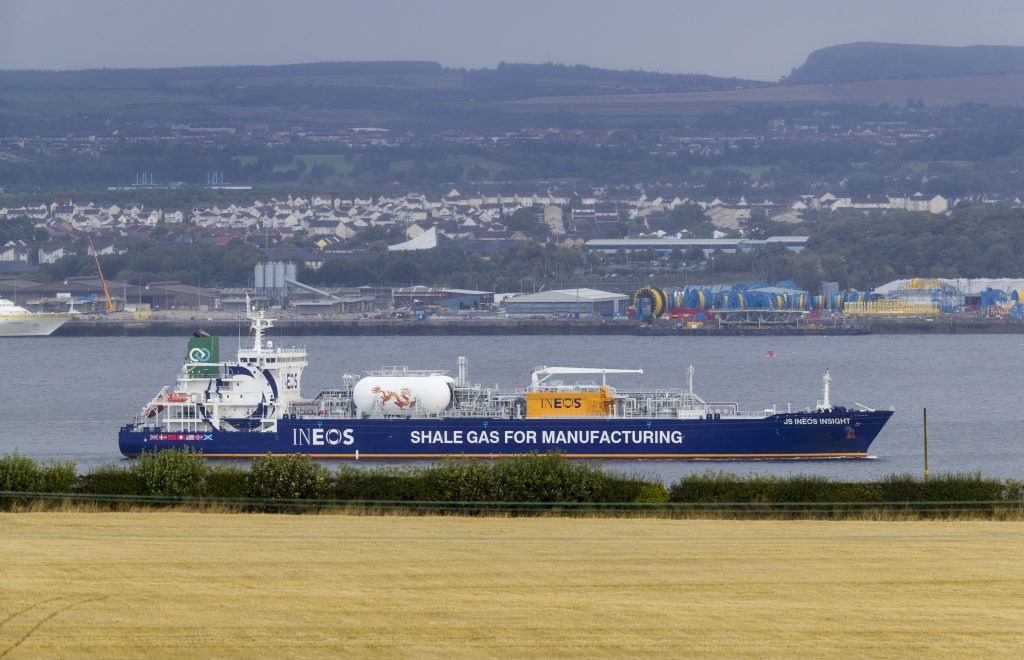
The founder of chemical giant Ineos said fracking in Scotland could have the potential to boost the country’s economy where the North Sea oil and gas industry is “leaving holes”.
Billionaire Jim Ratcliffe spoke exclusively to Energy Voice as more than 27,000m3 of ethane made its way to Grangemouth from the US for the first time.
He said the landmark moment for the company, which has been six years in the making, was a “brick in the wall” for the the site which was loss making when Ineos bought it over from BP.
The occasion has been dubbed by the company as the “Grangemouth Renaissance” which has seen the construction of the UK’s largest ethane gas storage tank.
The mammoth project by Ineos has seen a fleet of eight dragon class ships built specially to carry shipments of shale gas from Pennsylvania to the company’s headquarters in Norway and the UK through a “virtual pipeline”.
It will also mark a reduction in the amount of gas extracted from the North Sea.
The arrival yesterday of the Ineos Insight comes after $2billion of investment since the project’s inception.
Ratcliffe said: “Scotland at the moment, if you look at the economy, it’s operating at a trade deficit which means it’s spending more than its earning.
“Historically in Scotland the North Sea has created a lot of value for the Scottish economy but the North Sea is in decline so things will get worse, rather than better, from the point of view of what the North Sea can contribute.
“It just looks like a rational conclusion to me that shale gas could step in where the North Sea is leaving holes in the Scottish economy and maybe take the Scottish economy to a place where it’s in surplus rather than in deficit.
“I think the North Sea peaked in the year 2000 and today it’s producing less than 50% peak rate since 2000 and the forecast today is that in 10 years time it will be less than 20%.
“That doesn’t mean there will be no hydrocarbons coming out of the North Sea, it will still have oil and gas coming out of it but not in the quantities that the UK requires but there will be interesting opportunities in the North Sea in oil and gas and those are some of the things we are looking at but it simply won’t sustain the UK needs. We already are a net importer of gas, a net importer of oil.”
The ethane shipped being shipped to Europe originates from the Marcellus Shale in Western Pennsylvania.
Ineos revealed yesterday the next stage of the project would be to create a chemical “cluster” at the Grangemouth site where it will work with Scottish Enterprise to create a new home for chemical and other types of manufacturers.
The founder of Ineos also revealed the company had been able to contribute to the Scottish Government’s moratorium as much as it had “been allowed” and said the firm did not see a significant difference between conventional oil and gas and fracking.
He said a “vocal minority” were opposed to it but the success of US shale was evidence of its potential in the UK.
Ratcliffe said:”They banned all work in respect of shale so we can’t do the seismic and we can’t drill the exploratory wells and neither of those things involve fracking.
“But that’s at least a two to three year process and that really is just doing the scientific work to ascertain how much shale gas or shale oil is in that Scottish basin and if it is there if it’s producible because you have to be able to get it out.
“The pressures have to be such that if you drill a hole into the shale you can pull the gas out and that’s a two or three year piece of work. That clearly could have be done in parallel with the Scottish Government doing its homework on the environment and safety issues. They’ve clearly chosen not to do that.
“We’ve had all the dialogue we’ve been allowed, we’ve been quite clear on our views, we don’t think fracking really is any different to conventional oil and gas in terms of the safety and environmental issues and obviously Scotland is very comfortable with conventional oil and gas.
“It’s no difference really but for some reason there’s a vocal minority that have got excited about it and it’s difficult in a way for ourselves who are quite rational and have got a lot of exposure to what’s happening in America so we see very clearly that shale gas has been very successful in America, it’s been very safe and friendly and overall.
“It’s had one or two issues but then every industry has had one or two issues so we see the immense impact it has had on the US economy and we can’t understand why the Government is not open minded to that in Scotland.”
Recommended for you
